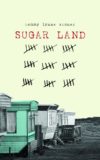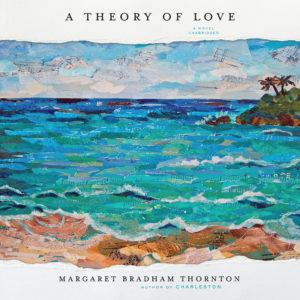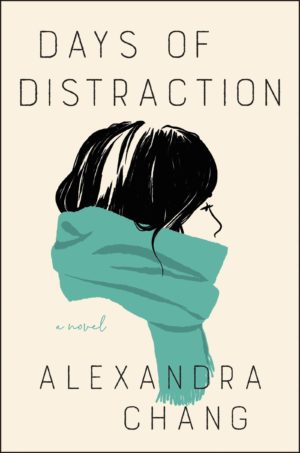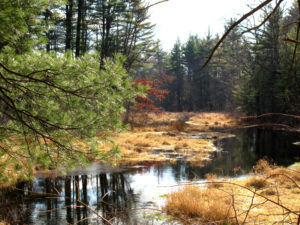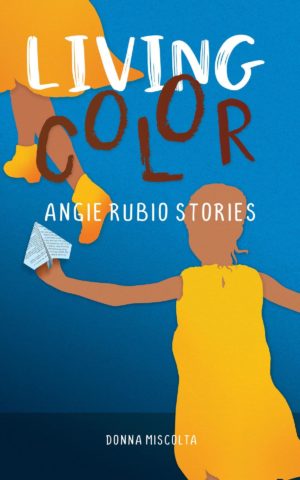The following text is excerpted from Marilla of Green Gables by Sarah McCoy. Copyright © 2018 by Sarah McCoy. Excerpted by permission of William Morrow. All rights reserved. No part of this excerpt may be reproduced or reprinted without permission in writing from the publisher.
VI.
Introducing John Blythe
The snows had melted and the rains had come, making everything and everyone in Avonlea sticky. Water seemed to come from every direction, even up from the ground where the drops splashed in puddles. You couldn’t walk a yard without being soaked through.
Marilla had run over to Rachel’s while one storm was moving off to Newfoundland and another was approaching from New Brunswick. She had barely made it to the Whites’ when the clouds broke open again. From the shelter of their porch, she turned to look out over Avonlea: the gulf in the distance roared; the wind was scented with melted icecaps and blew the trees like stalks of kelp; the rain fell faster and faster until it looked as if a veil had been drawn over the island, tinting everything wet gray. She hardly recognized Avonlea as home. From someone else’s front door, it looked so different.
“Come on, before you’re drenched!” Rachel pulled her inside. “I’ve done it! See here—I’ve perfected the rosette. Every bridal pattern from Paris to London is using it. They say the future Queen Victoria will have at least ten thousand rosettes on her coronation gown. I can’t even imagine!”
Rachel proudly held up her circular for admiration. The rosette chain didn’t look terribly different from the standard cable stitch, but Marilla kept silent.
“It’s exceedingly difficult. I can teach you,” Rachel offered. “But don’t be disheartened if you don’t pick it up as quickly as I did. It takes some years if they haven’t the God-given knack.”
Rachel had determined on their second meeting that Marilla didn’t share her “God-given knack,” but her work showed potential, Rachel thought, if Marilla diligently applied herself.
“I’d be very glad to learn,” said Marilla.
“Let’s get our prayer shawl stitching done first. Mother counted my rows before she and father left for White Sands.” Rachel pulled the skein of thick, fleecy yarn from her hamper. “They took my cousins some of Ella’s cooking. Poor dears. It’s the chicken pox. All five children broke out at the same time.” She started to loop her crochet needle around and through, around and through. Marilla joined her, working on the opposite end of the shawl.
“The pox is the most wicked illness,” Rachel continued with a maternal air. “Mother wrapped my fingers in cotton so I couldn’t scratch. Her mother did the same to her. You could scar your face for life if you aren’t cautious. Afterward, I healed without a single blemish. I once read a magazine story about a beautiful girl with a pock perfectly placed on her forehead so that it looked like she’d been anointed with a holy wound. That’s how it was described in the chapter: anointed with a holy wound. I thought it the loveliest thing I’d ever heard. I started drawing a little scar on my forehead with a dab of crushed carmine petals. When Mother forced me to confess what on earth I was doing with her rouge, she said it was wicked foolishness. She took me down to see one of the little French boys living on the wharf row—sorrowful child was pockmarked from ear to ear! A face like a corncob. I was so ashamed. I never wished for such a thing again.” She shook her head. “Have you had the pox?”
Marilla nodded. “When Matthew was nine and I was one year old. Mother said I was the sickest she’s ever seen. I was too young to remember the fever or itching, but Matthew and I have matching scars, so I know it must’ve been.”
“Do you really have a scar?” Rachel set down her crocheting.
Marilla thought it strange that Rachel would have such a morbid fascination. It was a chicken pox scar, as common as a freckle and unsightly as a mole. She couldn’t understand why Rachel would romanticize it. But then, Rachel was an only child and Marilla understood how an imagination left to its own could make the unknown a grand and beastly thing. So in this way, she knew something Rachel didn’t.
“It’s right here.” She rolled up her left sleeve cuff to reveal the inner crook of her elbow, white and soft from hiding. There, in the bony divot between flesh and bone was a teardrop hollow, no bigger than one of the rosettes on Rachel’s circular.
“Yours is the prettiest pock I’ve ever seen! If it’s any consolation,” said Rachel.
“Matthew has one on his right elbow,” Marilla explained. “Mother says it’s often that way with siblings. The pain that one feels, the other does too. When you’ve shared the same womb, it naturally follows that you share your lives.”
Rachel’s eyes softened to a glassy stare. “What if you haven’t siblings?”
Marilla rolled down her sleeve. She’d hurt Rachel, though she hadn’t meant to. “Well, I suppose that’s why God gave us friends.”
Rachel blinked hard and smiled. “Yes. Reverend Patterson gave a right nice sermon on that very subject last week. It’s a proverb: ‘A man with many friends comes to ruin, but there is a friend who sticks closer than a brother’—or sister in our case, right?”
Marilla nodded.
“Maybe I don’t have a scar on my elbow like you, but I have one right in the middle of my you-know-where after sitting on that stinger last month!” She giggled. “You saved me from eternal humiliation, Marilla Cuthbert. I’m forever grateful.”
Marilla didn’t see the accident or what she’d said as anything worthy of humiliation or gratitude. But again, she was fast learning that how she saw the world and how another did could be entirely dissimilar.
Ella interrupted their sewing. “Mademoiselle Rachel, Monsieur Blythe has come about a barter?”
Rachel tilted her head and frowned. “Mother and Father didn’t mention anything to me.”
“Nor to me. It’s Monsieur John Blythe,” Ella clarified. “Says he’s come on his father’s request regarding a gun.”
“A gun?” Rachel wrapped the yarn she was using back around the skein. “Father must’ve spoken to Mr. Blythe at the town hall meeting last Monday.” She put the sewing things back in the hamper. “Tell him that they aren’t home and to come back later.”
Ella nodded half-heartedly. “I suppose so . . . but he came all the way over in the downpour. Do you think we might offer him a warm drink? A chance to dry some? Seems the charitable thing to do, oui?”
Rachel looked to Marilla, who shrugged. She’d never met John Blythe, but she’d felt the force of the rain. It was enough to cut your nose off. Letting the worst of it pass before sending him back seemed sensible.
“All right then.” Rachel rose, smoothed her skirts, and pinched her cheeks.
Marilla thought that odd. She’d long ago given up on her appearance. She had Hugh’s angular cheekbones that caught the sun too much and so were never the alabaster of fashion but tanned like deerskin. Rouges and pinching only made her look a-splotched. She was just as she was. It didn’t bother her to be plain. Besides, it was only the dairy farmer’s son.
John Blythe sat two grades up from her at the Avonlea School. There weren’t any girls in his grade eight class. Most had left to help raise their younger siblings and do house chores. If anything, they home-studied like she did. So John Blythe had been little more than one of the rumpled dark heads in the crowd of older boys. However, there was a notable difference in Rachel as Ella brought him through the kitchen door. He seemed to have an effect on Ella too. Her tone changed. A jingle under its usual flat inflection.
“S’il vous plaît, come in, Monsieur Blythe. You must be chilled to the bone. Here, let me hang your coat to dry by the stove. I’ll make a tasse de thé. Mademoiselle Rachel and her company are waiting for you in the parlor.”
“Very kind of you,” he said.
Marilla thought it a pleasant voice.
Rachel moved a bang ringlet forward onto her forehead at his footsteps down the hall. Marilla scratched her neck.
The toe of his boot came out of the shadows first, followed by the rest of him. He was tall and muscular. The rain had plastered his shirt to his body like a second skin, revealing the outlines of his chest and arms and back. His wet, dark curls hung low on his forehead, making his hazel eyes look nearly golden in the parlor light. When he changed his gaze, from Rachel to Marilla and back, it was like being in the shine and then in shade.
“Hello, Rachel.”
“Why hello, John Blythe,” said Rachel. “This is my friend, Marilla Cuthbert.”
He nodded. “I know your brother Matthew. We schooled together before he went to work for your father. Nice to meet you.” He smiled, and his eyes gleamed brighter.
Marilla had to look away. It nearly pained her. Like staring into sun. “Nice to meet you.”
“As Ella informed you,” said Rachel with one hand on the curve of her hip, “my parents are not at home. They’ve gone over to visit my cousins at Four Winds. Was there some pressing business you needed?”
A drip of water fell from his temple to the parlor carpet. John pushed his hair back, and Marilla nearly gasped at the little pockmark nestled in his left temple. So small a thing. It would’ve gone unnoticed by everyone except . . . they were just speaking of their scars. Anointed, Rachel had said. Chills ran the length of Marilla’s body.
“My apologies for intruding. We didn’t know they were gone today,” explained John. “We arranged a barter. One of our jersey cows for a Ferguson that Mr. White purchased from a London exporter last year. My father sent me over to appraise the condition of the rifle before we bring over the heifer.”
Rachel cocked her head. “I remember that gun. Father said it was a waste of money. He’s never so much as loaded the thing. Not much to shoot at but bunnies and birds in Avonlea. Father hasn’t the time or bloodthirst for such diversions.”
John nodded. “He said as much to my father.”
“Well, feel free to have a look. He keeps it right over here.” She led them to the hall closet and pointed to the top shelf. “Practically new. Still in the box.”
“May I?” asked John.
“Have at it. I’d hate to think you came across town in a storm for nothing.”
John pulled the box down. His arms flexed beneath the damp cotton. The three found themselves standing too close together in the confinement of the narrow hallway. Marilla could smell the ripeness of wet leather and sea salt on his skin. He opened the box, and they gazed inside at the long, polished wooden barrel.
“I forgot how pretty it looks.” Rachel ran her fingers over the shiny metal trigger. “Almost like a royal scepter.”
“A dangerous one, perhaps,” said John.
Rachel lifted her chin. “Depends on how it’s used. If the aimer hits nothing but blue sky, it might as well be a scepter.” She laughed, a tinny sound that echoed down the tiled foyer.
Marilla had never seen a gun up close. She wasn’t even sure her father owned one. The gunpowder alone was too expensive, never mind the rifle. And as Mr. White had pointed out, there was no use for such a weapon in Avonlea. It was a civilized town on a civilized island. There were no dangers larger than an occasional vermin provoking their livestock, and for that a pitchfork did the job just as well as anything else. Mr. White had obviously bought it on a lark. But now, John had been told to trade a pricey cow for this fancy firearm, and Marilla was curious why.
“What would the Blythes need of a rifle like this?” asked Marilla.
John turned his face to her and her cheeks burned. “For protection.”
“Protection?” scoffed Rachel.
“We haven’t any enemies here,” insisted Marilla. “No wolves or bears. It’s an island.”
“‘No man is an island, entire of itself. Every man is a piece of the continent, a part of the main.’”
Mr. Murdock had read that to them once. The author’s name danced on the tip of her tongue . . .
“John Donne,” she said, having come to it.
John smiled at her. “You’re a smart one.”
Marilla felt something pull inside her like sands to the tide.
“Of course it’s an island,” Rachel huffed. “You think you’re so clever because your father lets you study all day. But my mother said there’s more to life than books.” She closed the lid on the rifle box. “You’ve seen it. Now you can go home and say so.”
John’s mouth twitched with a smile. “I’m obliged to you for letting me do the business I was tasked. I am but a lowly farmhand, Mademoiselle White.” He bowed like a liegeman.
“Don’t try to sweet-talk me. I’m immune to highbrow hooey.” Rachel flipped her skirt and went back to the parlor.
Marilla turned to follow, but John stood directly in her path.
“There’s rumor of an insurrection,” he said.
Marilla’s heart quickened to a gallop.
“By whom?”
“Canadian farmers, townsfolk, and tradesmen against the corrupt aristocracy—the Châteaux Clique and the Family Compact.”
Marilla knew of the Americans’ domestic warring, but such conflict had not been Canadian. Canadians were peaceable with their countrymen—or at least, so she’d believed. Seeing her unsettled, John put a hand on her elbow; his fingers wrapped round to the very spot she’d uncovered to Rachel the hour before. She could nearly feel his skin through the muslin sleeve.
“Don’t worry, Marilla. You’ll be safe.”
Marilla dared to meet his stare.
“I will?”
“Of course. I’m sure Matthew and your father are taking precautionary measures. Everyone is. Well . . .” —he looked away to the parlor where Rachel had returned to her sewing—“. . . most everyone. Mr. White told my father that the only reason he’d trade this rifle is because he’s already purchased another. A musket, more suited for targets at a close distance.”
Marilla’s palms went clammy, the danger suddenly all too close.
“Tea?” Ella carried the tray.
John released Marilla’s arm. “Thank you, but I better get going.”
Ella didn’t hide her chagrin. She slumped her way back to the kitchen.
“I’ll be sure to tell my father the rifle is in excellent condition,” John called to Rachel. “I’m sorry for interrupting your afternoon, Mademoiselle White. I hope you can resume your rousing stitchery upon my departure.”
“You are insufferable, Mr. Blythe!” said Rachel, but Marilla heard the giggle in it. So did John.
“Good day, Rachel.”
Rachel gave a mouse huff in reply.
“Good day, Marilla.”
He winked, and she thought it an awfully bold thing to do on their first meeting. Even bolder than taking her by the elbow. “Tell your brother Matthew that I said hello. It’s been too long since I came down to the Cuthbert place. Maybe I should.”
All three of the girls watched John trot away, his horse’s hooves splashing through fresh puddles. The rains had cleared, and the sky had opened up to a shimmering pink sunset.
Ella sighed. “He’s as handsome as the devil.”
Rachel twisted a curl around her finger. “I’ve seen handsomer. Besides, it seems the only one he’s interested in being civil toward is Marilla.”
Marilla shook her head. “Only because he’s friendly with Matthew.”
Rachel raised her eyebrows high. “Surely you would’ve met already if he and your brother were so close.”
Truthfully, Matthew had little time for friends. He and Father were too busy on the farm. And after the drunk fire, he hardly went out socially again. She wondered if John had been at the party that night. Probably not, she decided. Matthew was twenty-one to John’s sixteen. Too far apart in age to share schoolmates. So why then was John so terribly interested in visiting her brother now?
Rachel finished the crocheted row on her prayer shawl. “He’s not my type, but he’s mighty nice to look at. Don’t you agree, Marilla?”
“Handsome is as handsome does. What a person says and thinks are what count.”
It was getting late. Mother and Izzy would have supper waiting, so she packed up her sewing notions. Ella lit the oil lamps while Rachel walked her out to the porch. The air was fresh-scented of earth and mineral with the approach of night.
“So tell me this in truth, Marilla. What would you do if John Blythe showed up at your gable door?”
“I’d welcome him. Just as I would to you or any Avonlea friend.”
Rachel nodded. “Be careful walking. The light’s going quick, and I’d hate for you to fall into a mud hole.”
The whole way home, Marilla thought about the pock scar at John’s temple. It was hard to imagine his face born without it. Such a small feature. A flaw, by most opinions, and yet, to her, it was one of the interesting parts of him. It carried a story, and she understood why Rachel found the idea of a holy wound desirable.
**
Sarah McCoy is a New York Times,USA Today, and international bestselling author. McCoy’s work has been featured in Real Simple, The Millions, Your Health Monthly, Huffington Post and other publications. She has taught English writing at Old Dominion University and at the University of Texas at El Paso. She lives with her husband, an orthopedic sports surgeon, and their dog, Gilbert, in Winston-Salem, North Carolina.



